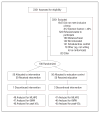Tai chi exercise in patients with chronic heart failure: a randomized clinical trial
- PMID: 21518942
- PMCID: PMC3277798
- DOI: 10.1001/archinternmed.2011.150
Tai chi exercise in patients with chronic heart failure: a randomized clinical trial
Abstract
Background: Preliminary evidence suggests that meditative exercise may have benefits for patients with chronic systolic heart failure (HF); this has not been rigorously tested in a large clinical sample. We sought to investigate whether tai chi, as an adjunct to standard care, improves functional capacity and quality of life in patients with HF.
Methods: A single-blind, multisite, parallel-group, randomized controlled trial evaluated 100 outpatients with systolic HF (New York Heart Association class I-III, left ventricular ejection fraction ≤40%) who were recruited between May 1, 2005, and September 30, 2008. A group-based 12-week tai chi exercise program (n = 50) or time-matched education (n = 50, control group) was conducted. Outcome measures included exercise capacity (6- minute walk test and peak oxygen uptake) and disease-specific quality of life (Minnesota Living With Heart Failure Questionnaire).
Results: Mean (SD) age of patients was 67 (11) years; baseline values were left ventricular ejection fraction, 29% (8%) and peak oxygen uptake, 13.5 mL/kg/min; the median New York Heart Association class of HF was class II. At completion of the study, there were no significant differences in change in 6-minute walk distance and peak oxygen uptake (median change [first quartile, third quartile], 35 [-2, 51] vs 2 [-7, 54] meters, P = .95; and 1.1 [-1.1, 1.5] vs -0.5 [-1.2, 1.8] mL/kg/min, P = .81) when comparing tai chi and control groups; however, patients in the tai chi group had greater improvements in quality of life (Minnesota Living With Heart Failure Questionnaire, -19 [-23, -3] vs 1 [-16, 3], P = .02). Improvements with tai chi were also seen in exercise self-efficacy (Cardiac Exercise Self-efficacy Instrument, 0.1 [0.1, 0.6] vs -0.3 [-0.5, 0.2], P < .001) and mood (Profile of Mood States total mood disturbance, -6 [-17, 1] vs -1 [-13, 10], P = .01).
Conclusion: Tai chi exercise may improve quality of life, mood, and exercise self-efficacy in patients with HF. Trial Registration clinicaltrials.gov Identifier: NCT00110227.
Figures


Comment in
-
Mind or body: evaluating mind-body therapy efficacy in heart failure trials.Arch Intern Med. 2011 Apr 25;171(8):758-9. doi: 10.1001/archinternmed.2011.92. Arch Intern Med. 2011. PMID: 21518943 No abstract available.
-
Yin and yang of tai chi exercise.Arch Intern Med. 2011 Oct 10;171(18):1685; author's reply 1685-6. doi: 10.1001/archinternmed.2011.458. Arch Intern Med. 2011. PMID: 21987204 No abstract available.
References
-
- Piña IL, Apstein CS, Balady GJ, et al. American Heart Association Committee on exercise, rehabilitation, and prevention. Exercise and heart failure: a statement from the American Heart Association Committee on exercise, rehabilitation, and prevention. Circulation. 2003;107(8):1210–1225. - PubMed
-
- Hunt S, Baker DW, Chin MH, et al. ACC/AHA guidelines for the evaluation and management of chronic heart failure in the adult: executive summary: a report of the American College of Cardiology/American Heart Association Task Force on Practice Guidelines (Committee to Revise the 1995 Guidelines for the Evaluation and Management of Heart Failure): developed in collaboration with the International Society of Heart and Lung Transplantation; Heart Failure Society of America. Circulation. 2001;104(24):2996–3007. - PubMed
-
- Coats AJ, Adamopoulos S, Radaelli A, et al. Controlled trial of physical training in chronic heart failure: exercise performance, hemodynamics, ventilation, and autonomic function. Circulation. 1992;85(6):2119–2131. - PubMed
-
- Kiilavuori K, Toivonen L, Näveri H, Leinonen H. Reversal of autonomic derangements by physical training in chronic heart failure assessed by heart rate variability. Eur Heart J. 1995;16(4):490–495. - PubMed
Publication types
MeSH terms
Substances
Associated data
Grants and funding
LinkOut - more resources
Full Text Sources
Medical
Research Materials
Miscellaneous

